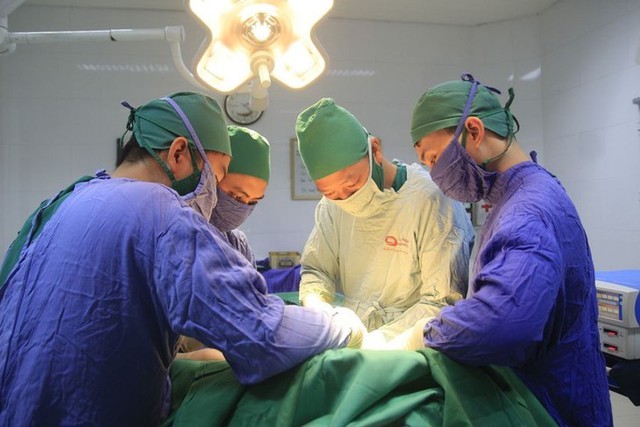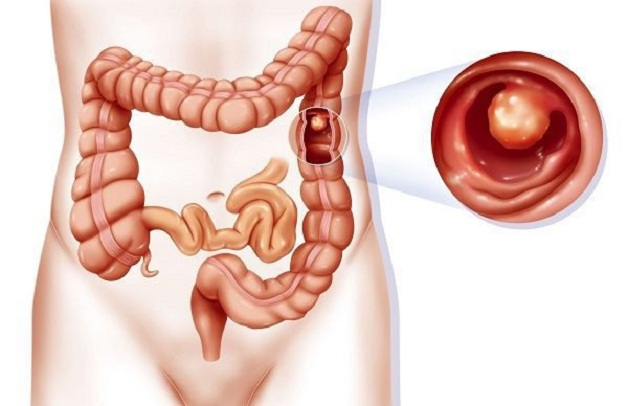Recently, doctors at Bai Chay Hospital said they performed emergency surgery on a male patient (30 years old) with intestinal obstruction due to a tumor in the hepatic flexure of the colon.
The patient is Mr. TXP (30 years old), residing in Thai Thanh commune, Thai Thuy district, Thai Binh province, admitted to the hospital with abdominal pain in the right iliac fossa, unable to defecate for two days.
When admitted to the hospital, the doctors examined and performed paraclinical tests. The CT scan results showed: The cecum and ileum had thick walls, with infiltration around the base of the ileum.

Surgical team for patient. Photo: BVCC
The hepatic flexure of the colon had uneven wall thickness, the thickest part was about 28mm in a length of about 90mm, there were nodules of absorbent mass protruding into the colon with unclear boundaries. The patient was diagnosed with: Septic shock, coagulation disorder/intestinal obstruction due to hepatic flexure tumor, emergency surgery was indicated.
The surgical team led by Dr. Nguyen Van Dung, Head of Oncology Department 1 - Bai Chay Hospital and the team successfully performed surgery to remove the right colon, remove lymph nodes, and create an ileostomy for the patient. Currently, after one day of surgery, the patient's health is stable.
Dr. Nguyen Van Dung said: Intestinal obstruction due to colon tumors is common in surgical emergencies and can threaten the patient's life if not detected early and treated promptly and properly. The earlier intestinal obstruction is detected and treated promptly, the more effective the treatment will be.
Who is at risk for colon cancer?
Currently, the main cause of colon tumors has not been completely determined, but caution is needed in the following cases:

- People over 50 and family history: Colon cancer is a disease that anyone can get, in which the high-risk group is people over 50 years old or have a family history of colon cancer.
- People with inflammatory bowel disease (IBD): If the patient has ever had inflammatory bowel disease such as ulcerative colitis, Crohn's disease, etc., then the risk of also having colon cancer is high.
- Obese people: Overweight or obese people also increase the risk of diseases, including colon-related diseases;
- People with unscientific living habits: Smoking and drinking too much alcohol will increase the risk of colon tumors and stimulate their growth.
- Sedentary people: Not being active and often just sitting still will affect the overall development of the digestive system.
Signs of colon cancer, need to be examined early
Usually, clinical manifestations of colon tumors are often similar and do not cause many specific symptoms. However, over time and factors such as location and size cause the tumor to grow, leading to the appearance of some of the following manifestations:

Illustration
- If the tumor is located in the ascending colon, the common symptom is diarrhea;
- In case the tumor is located in the descending colon, the patient often has prolonged constipation and sometimes constipation is mixed with diarrhea;
- If the tumor is located in the upper mucosa, ulcers may appear that cause bleeding, causing the patient to have fresh blood and mucus in the stool when defecating;
In addition, patients may experience additional symptoms such as headache, nausea and vomiting.
What to do to prevent colon cancer
- Follow a low-fat diet and instead increase your intake of foods such as green vegetables, fruits, and whole grains;
- Supplementing calcium is necessary for the body, accordingly calcium can be taken in many forms such as through food or calcium supplements.
- Limit alcohol consumption and smoking because they not only increase the risk of colon diseases but also other diseases.
- Increase exercise to train your body and maintain a suitable weight to avoid bad complications.
Source



































































































Comment (0)